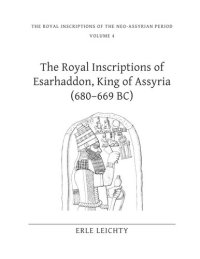
Ebook: The Royal Inscriptions of Esarhaddon, King of Assyria (680–669 BC)
Author: Erle Leichty
- Series: Royal Inscriptions of the Neo-Assyrian Period, 4
- Year: 2011
- Publisher: Penn State University Press
- Language: English
- pdf
The Royal Inscription of Esarhaddon, King of Assyria (680–669 BC) is the inaugural volume of the Royal Inscriptions of the Neo-Assyrian Period Project. The volume provides reliable, up-to-date editions of all of the known royal inscriptions of Esarhaddon, a son of Sennacherib who ruled Assyria for twelve years (680–669 BC). Editions of 143 firmly identifiable texts (which mostly describe successful battles and the completion of building projects, all done ad maiorem gloriam deorum), 29 poorly preserved late Neo-Assyrian inscriptions that may be attributed to him, and 10 inscriptions commissioned by his mother Naqia (Zakutu) and his wife Esharra-hammat are included. To make this corpus more user-friendly to both specialist and laymen, each text edition (with its English translation) is supplied with a brief introduction containing general information, a catalogue containing basic information about all exemplars, a commentary containing further technical information and notes, and a comprehensive bibliography (arranged chronologically from earliest to latest).
The volume also includes: (1) a general introduction to the reign of Esarhaddon, the corpus of inscriptions, previous studies, and dating and chronology; (2) translations of the relevant passages of three Mesopotamian chronicles; (3) 19 photographs of objects inscribed with texts of Esarhaddon; (4) indexes of museum and excavation numbers and selected publications; and (5) indexes of proper names (Personal Names; Geographic, Ethnic, and Tribal Names; Divine, Planet, and Star Names; Gate, Palace, Temple, and Wall Names; and Object Names). The book is accompanied by a CD-ROM containing transliterations of selected inscriptions arranged in a ‘musical score’ format.
The Royal Inscriptions of the Neo-Assyrian Period (RINAP) series will present up-to-date editions of the royal inscriptions of a number of late Neo-Assyrian rulers, beginning with Tiglath-pileser III (744–727 BC). This new series is modeled on the publications of the now-defunct Royal Inscriptions of Mesopotamia (RIM) series and will carry on where its RIMA (Royal Inscriptions of Mesopotamia, Assyrian Periods) publications ended. The project is under the direction of G. Frame (University of Pennsylvania) and is supported by the National Endowment for the Humanities.